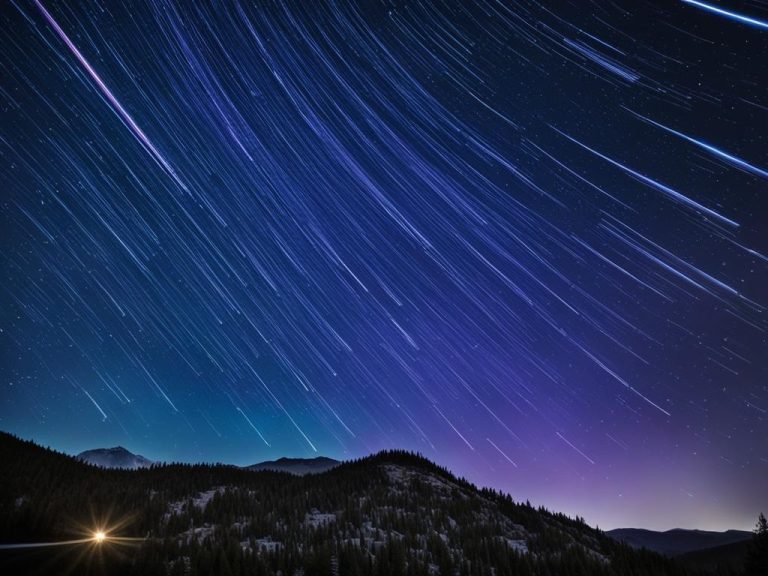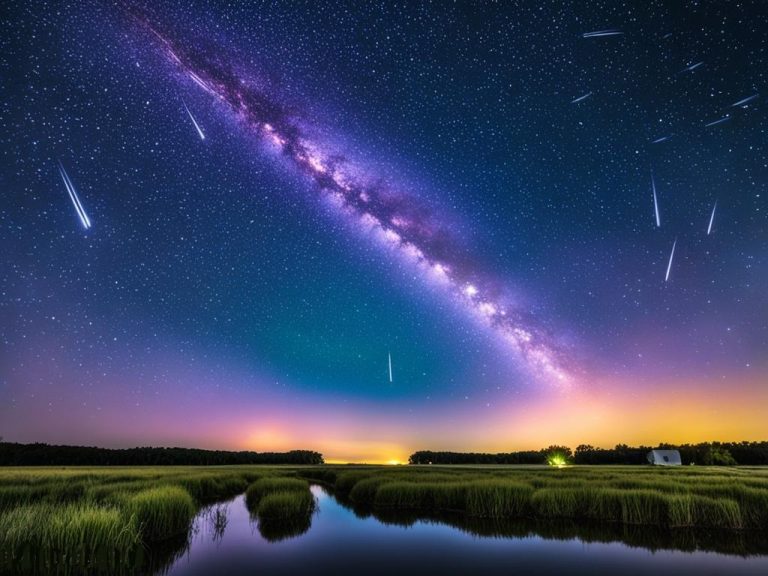The Delta Aquariid meteor shower lights up the summer sky with a dazzling display of shooting stars. This event happens every year and is known for its steady stream of meteors over several days. It will take place from July 18 to August 21, 2024. The best time to see it is on July 28 – 30, 2024.

Key Takeaways:
- The 2024 Delta Aquariid meteor shower will be active from July 18 to August 21.
- The peak of the meteor shower is expected from July 28 – 30, 2024.
- Under ideal conditions, you can expect a maximum hourly rate of 15 to 20 meteors.
- About 5% to 10% of Delta Aquarid meteors leave persistent trails.
- The Delta Aquariid meteor shower originates from a stream of debris left behind by Comet 96P/Machholz.
To enjoy the meteor shower, find a dark spot away from city lights, best after midnight. Look south in the night sky for the meteors coming from the constellation Aquarius, near the star Delta Aquarii. Remember, meteors can appear anywhere in the sky, so look all around.
The Delta Aquariids in 2024 have good viewing conditions. The shower’s peak is a few days before the New Moon. This makes it easy to see the radiant in the southern sky, perfect for observers in the United States.
The Delta Aquariids are believed to bring good luck, especially in love and relationships. Astrologers say it’s a magical time to make wishes and set intentions.
Bring someone special to share a fun activity that wont be forgotten. Even if you can’t catch a falling star, you can share a timeless memory.
For a personal touch, buy a star package to name a star in a summer constellation for your favorite stargazing companion. Each year when you return to check out this annual meteor shower, your star gift will be shining overhead!
Don’t miss the peak dates for the 2024 Delta Aquariid meteor shower. This magical night sky event is a chance to see the summer sky filled with shooting stars and celestial wonders.
Stargazing Tips for the Delta Aquarids Meteor Shower
Are you ready for an amazing event that will fill the summer sky with shooting stars? The Delta Aquariids meteor shower is coming soon, peaking on July 29-30, 2023. Here are some tips to make your stargazing experience unforgettable.
Find the Perfect Spot
Choosing the right spot is crucial for enjoying meteor showers. For the best view of the Delta Aquariids, find a dark area. there are specific locations identified and preserved for viewing the sky. They’re known for its great stargazing conditions. You might see up to 20 meteors per hour at its peak.
If you’re in the Southern Hemisphere or the southern parts of the Northern Hemisphere, you’re in luck. These areas are perfect for seeing the Southern Delta Aquariid meteor shower.
Anza Borrego State Park in Southern California is a great place in the US for astronomy events. It has some of the darkest skies around, making it ideal for watching the Delta Aquariids in the sky overhead. This active star watching area is known to attract people from all to enjoy the starry night sky.
Prepare for Dark Adaptation
Before you start stargazing, let your eyes get used to the dark. It might take up to 30 minutes. Try not to look at bright lights or use your phone to keep your eyes dark-adapted. The darker it is, the better you’ll see the meteors.
Scan the Summer Sky
To see the Delta Aquariid meteor shower, look towards the constellation Aquarius in the southern sky. But don’t just focus on that area. Meteors can appear anywhere in the sky, so keep scanning for shooting stars.
Capture the Moment

Don’t forget to capture this incredible celestial event. Bring your camera or smartphone for long exposure shots of the sky. You might catch a meteor streaking across the sky.
With these stargazing tips, you’ll be ready to enjoy the Delta Aquariids meteor shower. The shower goes until dawn, giving you plenty of time to enjoy the night sky. So, grab your blankets, find a cozy spot, and get ready for nature’s celestial show.
The Parent Comet of the Delta Aquariid Meteor Shower
Ever wondered where the Delta Aquariids meteor shower comes from? It’s thanks to the 96P/Machholz Complex, a parent comet. This complex includes eight meteor showers and two comet groups: Marsden and Kracht.
In 1986, Don Machholz, a keen astronomer, found the parent comet, Comet 96P/Machholz. This comet orbits the sun every 5.3 years and gets much closer to the sun than Earth. The material for the Delta Aquariid meteor shower left the comet about 20,000 years ago.
The stunning meteors we see during the Delta Aquariid meteor shower link back to this comet. This connection makes the event even more magical and thrilling.
Delta Aquariids vs. Perseids: How to Tell Them Apart
As you look up at the night sky, you might see a beautiful annual meteor shower. The Delta Aquariids and the Perseids are two showers that happen around the same time. They both show us shooting stars, but they are different.
The first way to tell them apart is by their radiant points. The radiant point is where the meteors seem to come from in the sky. For the Delta Aquariids, this spot is near the Delta star in the constellation Aquarius. The Perseids come from the constellation Perseus.
If the meteors seem to come from the south, they’re probably Delta Aquariids. If they come from the northeast or north, they’re Perseids.
The timing of each astronomical event also helps tell them apart. The Delta Aquariids happen from late July to early August, overlapping with the Perseids. The Delta Aquariids are most active around 2 hours after midnight. The Perseids are most active before dawn.
This means if you see the shower in the early morning, it’s likely the Perseids.
In some years, you might see both showers in one night. Seeing their paths cross can be amazing.
Remember, the radiant points of meteor showers don’t really connect to stars or clusters. They just look that way because the meteors follow similar paths when they enter Earth’s atmosphere.
So, next time you see a meteor shower, look at the radiant point and where the meteors come from. This will help you know if it’s the Delta Aquariids or the Perseids you’re seeing.
Other Meteor Showers to Look Out For
There are many amazing meteor showers besides the Delta Aquariids. Each one of these astronomical phenomena has its own special features and beauty. They light up the sky and are a treat for stargazers.
The Orionids come from the constellation Orion in late October. They move quickly across the sky and sometimes show bright fireballs.
Draconids are unique too. They come from Draco and their brightest point is in the sky as night falls. Sometimes, they put on a show with hundreds of meteors in an hour.
In mid-November, the Leonids take center stage. They come from Leo and can create stunning displays. Sometimes, they even show bright fireballs in the sky.
The Taurids add magic to the night sky. They have two streams, the South and North Taurids, coming from Taurus. These meteors are slow but can be very bright and sometimes turn into fireballs.
Each meteor shower offers a chance to see the universe’s beauty. For more info on these and other amazing meteor showers, check out this meteor shower guide.
Conclusion
The night sky lights up with a beautiful show as the Delta Aquarids meteor shower happens. It offers up to 20 meteors per hour, giving us a steady stream of shooting stars. These stars move across the sky, creating a magical scene.
The Northern Delta Aquarids might show a few meteors an hour. But the Southern Delta Aquarids are the stars of the show. They peak on July 28-29th and are active from mid-July to mid-August. This event is linked to the comet 96P/Machholz, making it a special display of nature’s fireworks.
To see this amazing event, follow some tips for stargazing and find a dark spot away from city lights. The best time to watch is from late July 27th to the 30th, between midnight and sunrise. Also, a nearly New Moon makes it easier to see the meteors.
Even though the Delta Aquarids might be less bright than some other showers, like the Perseids, don’t miss out. About 5% to 10% of the meteors leave behind glowing gas trails. These trails stay visible for a few seconds after the meteor goes by. They happen about 60 miles above Earth, adding to the magic of the sky.
So, put it on your calendar and enjoy the Delta Aquarids meteor shower. It’s a great event for anyone who loves the stars. Whether you’re an expert or just starting, this shower will amaze you with its beauty.
FAQ
When does the Delta Aquarids meteor shower occur?
The Delta Aquarids meteor shower happens from July 12 to August 23. The best time to see it is on the night of July 28 and the morning of July 29, 2024.
How many meteors can I expect to see during the Delta Aquarids meteor shower?
You might see up to 20 meteors per hour at its peak. This makes it an average shower.
Where can I see the Delta Aquarids meteor shower?
Look south from a dark spot after midnight to see the Delta Aquarids. Meteors seem to come from the Aquarius constellation but can appear anywhere in the sky.
Is it possible to see both the Delta Aquariids and Perseids meteor showers?
Yes, you can see both showers in a good year for meteors.
How can I distinguish between the Delta Aquariids and Perseids meteor showers?
Delta Aquariids radiate from the Aquarius constellation. Perseids radiate from Perseus. If meteors are from the south, they’re Delta Aquariids. If they’re from the northeast or north, they’re Perseids.
Are there any other notable meteor showers throughout the year?
Yes, there are other big meteor showers like the Orionids, Draconids, Leonids, and Taurids. They happen at different times and come from various constellations.
Can I name a star as a special souvenir of the Delta Aquarids meteor shower?
Yes, you can name a star as a gift at starregistry.com. It’s a unique way to remember the night.
